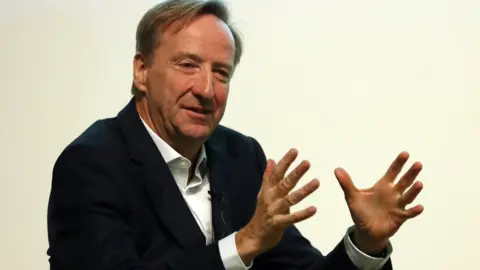Alex Younger: MI6 chief 'perplexed' over Matthew Hedges case
The leader of the UK's MI6 intelligence service has said he is "perplexed" over why the United Arab Emirates jailed British academic Matthew Hedges.
Alex Younger said he "genuinely can't understand how our Emirati partners came to the conclusions they came to".
Mr Hedges was accused of spying for MI6 and jailed in the UAE last month, but he was later pardoned.
In a rare speech, Mr Younger also warned Russia "not to underestimate our capabilities".
He described how MI6 exposed the perpetrators of the Novichok poisoning in Salisbury and warned that Britain's adversaries view themselves as being in a state of "perpetual confrontation" with the UK.
Last month, an Abu Dhabi court found Mr Hedges guilty of "spying for or on behalf of" the UK government, and he was jailed for life.
Prosecutors said Mr Hedges had admitted the charges but the 31-year-old denied spying and said he had been researching the country's security strategy as part of his PhD studies at Durham University.
A week later, the UAE issued the pardon as part of a series of orders on the country's National Day anniversary and Mr Hedges was freed.
In the second public speech by the man known as "C" in the four years since his appointment, Mr Younger addressed the case.
"We are perplexed by what has happened," he said, speaking at St Andrews University.
"There are some frank conversations ahead of us but we need to make sure that partnership works."
 Getty Images
Getty ImagesMr Younger also spoke of the need for "fourth-generation espionage", fusing human skills with technical innovation.
He encouraged students to consider joining MI6, saying tackling modern adversaries who use new technology to probe UK institutions and defences will require "a mindset that mobilises diversity and empowers the young".
Mr Younger re-emphasised the importance of strengthening security ties in Europe.
'Active' threat
He said Britain's spies have thwarted multiple Islamic State plots originating overseas, often in partnership with European allies.
UK intelligence agencies have played "an important contribution" in helping European countries, particularly France and Germany, prevent terrorist attacks in their countries or against their citizens, he said.
Mr Younger also spoke about facing "adversaries who regard themselves as being in a state of perpetual confrontation" with the UK.
He said: "I urge Russia or any other state intent on subverting our way of life not to underestimate our determination and our capabilities, or those of our allies."
The expulsion of Russian intelligence officers by the UK, following the Novichok poisoning in Salisbury, had significantly reduced Russian intelligence capability, Mr Younger said.
The speech comes at a time of heightened tensions between the UK and Russia. In the most recent incident on Saturday, Defence Secretary Gavin Williamson called on the public to report suspicious activity near military sites, after a Russian TV crew prompted an alert at an Army base.
Earlier this year, GCHQ chief Jeremy Fleming said Moscow posed a "real" and "active" threat to the international community in the wake of the Salisbury poisoning. Russia denies any involvement.
